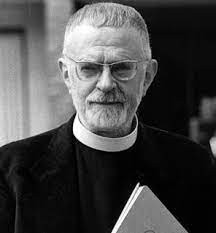LOUIS BOUYER

LOUIS BOUYER CO (17 February 1913 – 22 October 2004), was a French Catholic priest and former Lutheran minister who was received into the Catholic Church in 1939. During his religious career he was an influential theological thinker, especially in the fields of history, liturgy and spirituality, and as peritus helped shape the vision of the Second Vatican Council. Along with Joseph Cardinal Ratzinger, Hans Urs von Balthasar, and others, he was a co-founder of the international review Communio. Born into a Protestant family in Paris, Louis Bouyer, after a receiving a degree from the Sorbonne, studied theology with the Protestant faculties of Paris and then Strasbourg.
He was ordained a Lutheran minister in 1936 and served as vicar of the Lutheran parish of the Trinity in Paris until World War II. In 1939, the study of the christology and ecclesiology of St. Athanasius of Alexandria led Bouyer to the Catholic Church.
Received into the Catholic Church in the Abbey of Saint-Wandrille (Seine-Maritime) in 1944, he entered the congregation of the priests of the Oratory, and remained with them the rest of his life.
In 1969 he wrote the book The Decomposition of Catholicism, which presented what he saw as important liturgical and dogmatic problems in the Church. He was chosen by the pope to be part of a team to initiate the International Theological Commission that same year. He became a prolific theological writer and teacher worldwide. His works have had an enduring impact on Catholic theology. In 1999 he received the Cardinal-Grente prize of the French Academy for all his work. He died 22 October 2004 in Paris, a victim of many years of Alzheimer’s. He was buried in the cemetery of the Abbey of Saint-Wandrille.
Louis Bouyer was one of the most comprehensive theologians of the twentieth century. He wrote seminal works on Scripture, liturgy, spirituality, ecumenism, and dogmatic/systematic theology. He was also an important scholar of Newman and wrote a spiritual biography of the great English Oratorian cardinal and theologian that helped encourage a shift in perception of Newman in European ecclesial circles that eventually played a role in enabling the saint’s canonization. His work at the very least anticipated some of the important reforms of the Second Vatican Council in regard to liturgy, scriptural interpretation, ecclesiology, and even anthropology. Hans Urs von Balthasar promoted his books and translated some of them into German. Pope Benedict XVI was influenced by some of his writings on liturgy and once referred to Bouyer as “a mind of a very special character.” Pope Paul VI read several of his books and once recommended him to the Roman clergy, along with Henri de Lubac and Charles Journet, as a contemporary theologian whose theology can be of great help for priests in understanding dogma and nourishing their preaching and contemplation. Interestingly, Flannery O’Connor greatly admired his books and even reviewed some of them. I think that Bouyer’s liturgical, monastic, and Eucharistic theology exercised a real influence on some eminent contemporary French philosophers/theologians, such as Jean-Luc Marion and Jean-Yves Lacoste. Certainly, Bouyer was a great influence on Cardinal Jean-Marie Lustiger, the former Cardinal Archbishop of Paris, who was a spiritual mentor for these latter figures and a person of historical importance. Bouyer was, along with Fr. Bernard Botte, O.S.B., one of the redactors of the second Eucharistic Prayer of the Catholic liturgy—as readers of his Memoirs know all too well! His 1945 book The Paschal Mystery brought the language of “paschal mystery” into the common parlance of the Church, a fact about which he was more than a little ambivalent, to say the least. My view as an unrepentant systematic theologian is that Bouyer’s most important work is a nine-volume overview of dogmatic theology, in three trilogies, that covers the classic themes of theology from the perspective of a theology of wisdom influenced by the Russians Vladimir Soloviev, Pavel Florensky, and Sergei Bulgakov……. Dr. Keith Lemna, Associate Professor of Systematic Theology